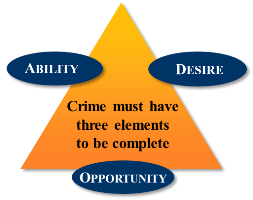Neighborhood Watch
Cripple the Crime Triangle
Three elements are necessary for a crime to occur: Ability, Desire and Opportunity. There is very little that a citizen can do to impact a criminal's ability or desire to commit a crime. What a citizen can do, however, is to limit criminal opportunity. Our Crime Prevention Unit can show you how to reduce criminal opportunity, which in turn, will reduce your chances of becoming a crime victim. By investing a small amount of your time, you can become the eyes and ears of the police department. Together we can help reduce the crime in your neighborhood.
It's as Easy as One, Two, Three...
One...
 Contact your neighbors and determine if interest in starting a Neighborhood Watch group exists.
Contact your neighbors and determine if interest in starting a Neighborhood Watch group exists.
Two...
Contact LPD's Crime Prevention Unit via email or by calling 402-441-6514. You will be sent a Neighborhood Watch start up kit, which contains a group roster sheet, a Neighborhood Watch book and window stickers.
Three...
The last step is to go back to your neighbors and gather the needed information for the group roster. Then return the roster to the Crime Prevention Unit to activate your group. Once your group has been activated, you will be sent the needed materials to supply your group.
Neighborhood Watch is a tried, tested and proven program involving cooperation between citizens and the police. In Neighborhood Watch, you are encouraged to work with your neighbors and report suspicious activity and crime to the police. This cooperation between citizens and the police has resulted in a decrease of crime in the Neighborhood Watch group areas.
Neighborhood Watch, Block Watch, Town Watch, Crime Watch--whatever the name, it's one of the most effective and least costly ways to prevent crime and reduce fear. Neighborhood Watch fights the isolation that crime both creates and feeds upon. It forges bonds among area residents, helps reduce burglaries and robberies, and improves relations between police and the communities they serve.
Neighborhood Watch Newsletter | The Eye
The ABCs of Neighborhood Watch
- Any community resident can join-young and old, single and married, renter and home owner.
- A few concerned residents, a community organization, or a law enforcement agency can spearhead the effort to organize a Neighborhood Watch.
- Members learn how to make their homes more secure, watch out for each other and the neighborhood, and report activities that raise their suspicions.
- You can form a Neighborhood Watch group around any geographical unit; a block, apartment, park, business area, public housing complex, office, marina.
- Watch groups are not vigilantes. They are extra eyes and ears for reporting crime and helping neighbors. Neighborhood Watch helps build pride and serves as a springboard for efforts that address community concerns such as recreation for youth, child care, and affordable housing.
Getting Organized
When a group decides to form a Neighborhood Watch, it can:
- Contact our Crime Prevention Unit for help in training members on home security and reporting skills and for information on local crime patterns.
- Select a coordinator and block captains who are responsible for organizing meetings and relaying information to members.
- Recruit members, keeping up-to-date on new residents and making special efforts to involve the elderly, working parents, and young people.
- Work with local government or law enforcement to put up Neighborhood Watch signs, usually after or least 50 percent of all households are enrolled.
Neighbors Look for...
- Someone screaming or shouting for help.
- Someone looking into windows and parked cars.
- Unusual noises.
- Property being taken out of houses where no one is at home or closed businesses.
- Cars, vans, or trucks moving slowing with no apparent destination, or without lights.
- Anyone being forced into a vehicle.
- A stranger sitting in a car or stopping to talk to a child.
- Abandoned cars.
How to Report
- Give your name and address.
- Briefly describe the event--what happened, when, where, and who was involved.
- Describe the suspect: sex and race, age, height, weight, hair color, clothing, distinctive characteristics such a beard, mustache, scars, or accent.
- Describe the vehicle if one was involved: color, make, model, year, license plate, and special features such as stickers, dents, or decals.
Staying Alive
It's an unfortunate fact that when a neighborhood crime crisis goes away, so does enthusiasm for Neighborhood Watch. Work to keep your Watch group a vital force for community well-being.
- Organize regular meetings that focus on current issues such as drug abuse, "hate" or bias-motivated violence, crime in schools, child care before and after school, recreational activities for young people, and victim services.
- Organize community patrols to walk around streets or apartment complexes and alert police to crime and suspicious activities and identify problems needing attention.
- Adopt a park or school playground. Pick up litter, repair broken equipment, paint over graffiti.
- Work with local building code officials to require dead bolt locks, smoke alarms and other safety devices in new and existing homes and commercial buildings.
- Publish a newsletter or create a social media page that gives prevention tips and local crime news, recognizes residents of all ages who have "made a difference," and highlights community events.
- Don't forget social events that give neighbors a chance to know each other--a block party, potluck dinner, volleyball or softball game, picnic.